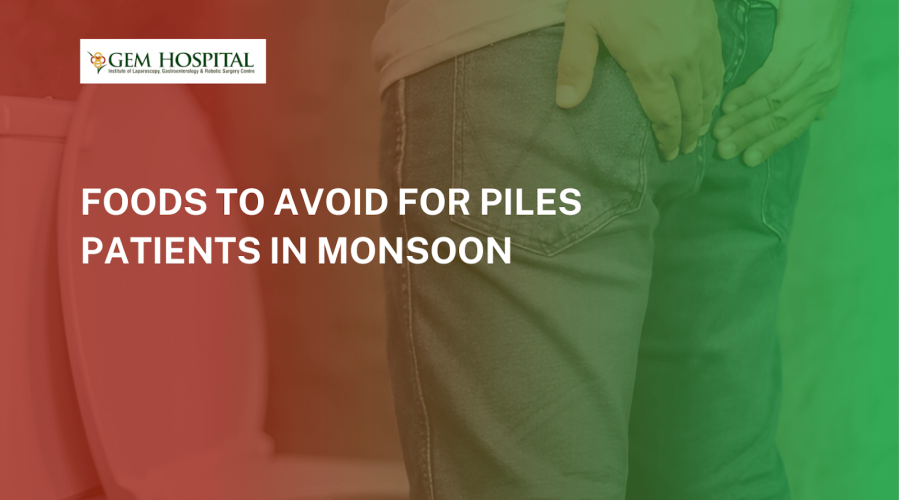Learn what gallstones are, their common symptoms, causes, and treatment options. Discover when to seek medical care and how to manage gallstone complications effectively.
Foods to Avoid for Piles Patients in Monsoon

The monsoon brings relief from summer heat, but it also brings humidity, digestive discomfort, and an increased risk of piles flare-ups. For people suffering from piles (hemorrhoids), diet plays a key role in preventing pain, swelling, and bleeding. While many focus on what to eat, understanding foods to avoid for piles patients is equally crucial — especially during the monsoon when digestion naturally slows down.
Why Diet Matters More During Monsoon
During the rainy season, the body’s digestive fire (known as Agni in Ayurveda) weakens. This makes it harder to digest oily, spicy, or heavy foods. For piles patients, such foods can lead to constipation one of the primary triggers for piles symptoms.
Humidity also increases bacterial growth, which can cause infections in already sensitive anal veins. Hence, eating clean, fiber-rich food and avoiding trigger foods can prevent painful flare-ups.
Top Foods to Avoid for Piles Patients in Monsoon
1. Spicy and Deep-Fried Foods
Spices like chili, pepper, and fried items such as pakoras, samosas, or bhajis might sound tempting during rainy evenings — but they are the biggest culprits.
These foods irritate the intestinal lining, cause acid reflux, and worsen inflammation in piles. They can also lead to dehydration and constipation.
Better Choice: Opt for lightly spiced soups or steamed snacks instead of oily ones.
2. Processed and Junk Foods
Burgers, pizzas, chips, and instant noodles are low in fiber and high in fat, sodium, and preservatives. Such foods slow down bowel movement, making stools harder to pass.
During monsoon, when your metabolism is already sluggish, junk foods can quickly worsen piles symptoms.
Better Choice: Replace them with homemade snacks like boiled corn, roasted chickpeas, or vegetable sandwiches made with whole-grain bread.
3. Red Meat and Processed Meats
Red meat (beef, mutton, pork) and sausages are high in fat and take a long time to digest. The slow digestion increases pressure in the abdomen and can cause hard stools.
Processed meats also contain chemical additives that trigger inflammation.
Better Choice: Choose protein sources like lentils, paneer, tofu, or fish (in moderation) for easier digestion.
4. Dairy Products (in Excess)
While milk and curd can be healthy in small amounts, excessive dairy — especially cheese, butter, or cream — can cause bloating and constipation for some people.
Monsoon humidity slows down gut activity, and dairy fat tends to make stool sticky and hard to pass.
Better Choice: Stick to low-fat milk or curd in moderation. Avoid cheese-heavy dishes and ice creams.
5. Refined Flour and Sugar
Refined carbohydrates like white bread, maida-based snacks, pastries, and sweets have very little fiber. They slow digestion and cause stool hardening.
Sweets and desserts also increase body heat, which can aggravate piles inflammation.
Better Choice: Replace with multigrain options, jaggery-sweetened dishes, or natural fruits to satisfy sweet cravings.
6. Caffeine and Carbonated Drinks
Tea, coffee, and soft drinks might give temporary relief from fatigue, but they dehydrate the body. Lack of hydration leads to hard stools — a common trigger for piles pain.
Carbonated drinks also cause gas and bloating, worsening discomfort.
Better Choice: Drink warm water, herbal teas like ginger or chamomile, and coconut water for hydration.
7. Pickles and Salty Foods
High-salt foods retain water and increase pressure in veins, worsening piles swelling. Pickles, papads, and salted snacks should be limited, especially during monsoon when digestion is already weak.
Better Choice: Use lemon or vinegar for tanginess instead of salt-loaded pickles.
8. Alcohol and Smoking
Alcohol dehydrates the body and damages liver function, leading to constipation and poor blood circulation. Smoking further constricts blood vessels, worsening anal inflammation.
These habits can delay healing and increase the risk of recurrent piles attacks.
Better Choice: Avoid alcohol completely during treatment. Focus on detox drinks like jeera water or buttermilk.
9. Low-Fiber Diets
A diet low in fiber is the primary cause of constipation and piles flare-ups. If your meals mostly consist of white rice, refined flour, or meat, you’re at higher risk.
Better Choice: Include fiber-rich foods like brown rice, oats, whole wheat chapati, and fresh fruits daily.
10. Cold and Fermented Foods
Cold beverages, ice creams, or fermented foods like idli and dosa batter left for long hours in humid weather can cause digestive imbalance.
They may lead to bloating, acidity, and increased discomfort in piles.
Better Choice: Eat freshly cooked, warm meals that are easy to digest.
Additional Monsoon Tips for Piles Patients
- Stay hydrated: Drink at least 2.5 L of water daily to soften stool.
- Eat at regular intervals: Avoid long gaps between meals.
- Include probiotics: Fresh curd or buttermilk helps maintain gut health.
- Exercise moderately: Light yoga or walking improves digestion and circulation.
- Maintain hygiene: Wash the anal area with warm water after every bowel movement to prevent infection.
When to Consult a Doctor
If you experience persistent bleeding, severe pain, or swelling around the anal area, don’t ignore it. Monsoon infections can complicate piles and delay healing.
A colorectal specialist can assess whether you need medication, non-surgical therapy, or laser treatment.
Managing piles during the monsoon isn’t just about what you eat — it’s about what you avoid. Staying away from oily, spicy, processed, and dehydrating foods can make a huge difference in controlling pain and improving recovery. Focus on hydration, fiber-rich meals, and a clean digestive routine.
If symptoms persist or worsen, it’s best to consult the experts at GEM Hospital, renowned for advanced and painless piles treatment options.
Book an appointment today and take the first step toward relief and long-term wellness.
Blogs & Article
Learn about bloating and gas problems, including common causes, symptoms, and effective solutions to improve digestion, reduce discomfort, and maintain gut health.
Learn how unverified Ayurveda treatments may cause liver damage, understand the risks, symptoms, and why medical guidance is essential for safe care.


